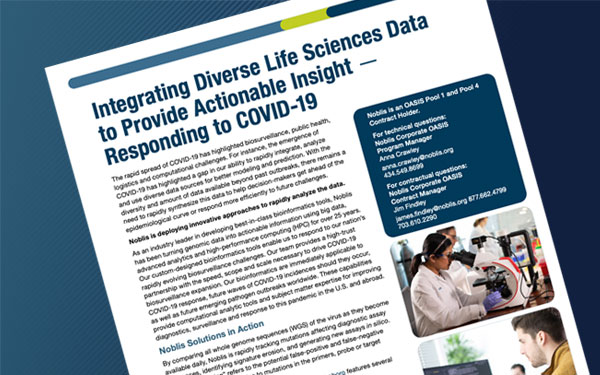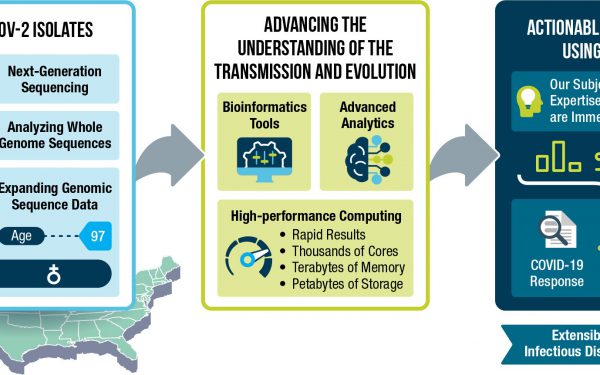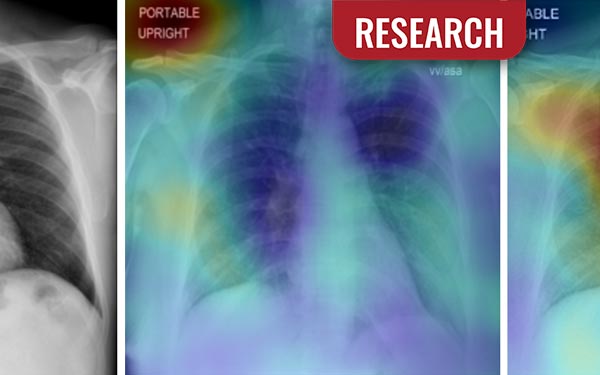DNA Sequencing in the Field – Expanding the Potential of DNA Analysis to Improve Health, Science and National Security
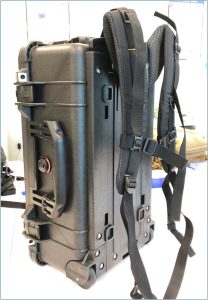
Rapid, accurate biological threat identification is critical for making informed decisions that protect our nation. DNA sequencing – the process of “reading” a sample’s genetic blueprint – is the integral first step in organism identification which has widespread applications in biosurveillance. Although DNA sequencing has become a well-established industry practice, typical methods of sample collection and transportation to a dedicated lab facility for analysis consumes valuable time when public health and safety are at stake. Further increasing turnaround time, sequencing and analysis often requires a resource-intensive high-performance computing (HPC) infrastructure to generate actionable insight.
The Noblis Field-Portable DNA Sequencing Solution
A Noblis team of biologists and engineers conceptualized an integrated, self-contained system with reduced size and weight, while providing a working surface for ease of use. The engineers used computer aided design (CAD) software to design the latest configuration of the system, then quickly built a carry-on size prototype for additional testing.
The portable sequencing and analysis system:
- Enables rapid organism and metagenomic classification in the field without an internet connection or in line power
- Provides a complete end-to-end sample to answer analysis in less than 2 hours (versus transport and facilities-based sample analysis in about 24 hours)
- Is equipped with field portable miniaturized sequencing technology to expand the usability and efficiency of field based genetic sequencing
- Is preloaded with databases and analytics workflows created by Noblis subject matter experts that have been reduced into a footprint small enough to fit on a commercial-off-the-shelf (COTS) laptop
- Detects a variety of anomalies including engineering
Our process (figure 1) includes 1) loading pre-computed databases onto a COTS laptop, 2) in field sample collection and processing including preparation, DNA extraction, purification, sequencing, basecalling, 3) pre-installed sequence databases and analytical workflows on a COTS laptop,4) in field classification without internet or inline power leveraging pre-installed databases and workflows, and 5) optional in-depth analysis of target sequences at Noblis facilities.
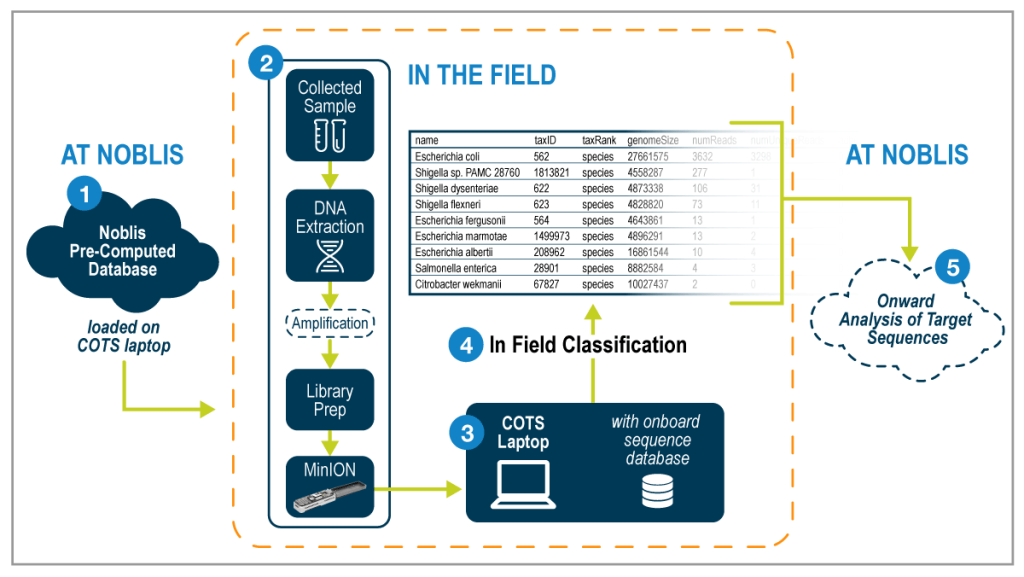
Our Approach
Real-World Applications
Use Case1: Advancing Informatics in the Field
CHALLENGE
To facilitate earlier warning, detection, and characterization of biological pathogens, especially unknowns and potentially engineered organisms.
SOLUTION
The Noblis team combined nanopore sequencing and advanced informatics with subject matter expertise and iterative user feedback to build a portable system delivering user friendly, simple, generalizable methods for genomics-based threat detection.
OUTCOME
The Noblis team developed a foundation for genomics-based threat detection during the pandemic, submitting more than 360 SARS-CoV-2 whole genome sequences to GenBank from clinical samples (figure 2). During a U.S. government sponsored project, we developed an early prototype bioinformatics platform to detect a broad range of engineering signatures and assign an associated probability of human manipulation. The integrated platform contains a machine learning classifier, natural language processor and whole genome alignment tool. Elements of this platform have been deployed on the portable sequencing and analysis system. Learn more about Noblis’ work for COVID-19 response at https://noblis.org/covid-19/.
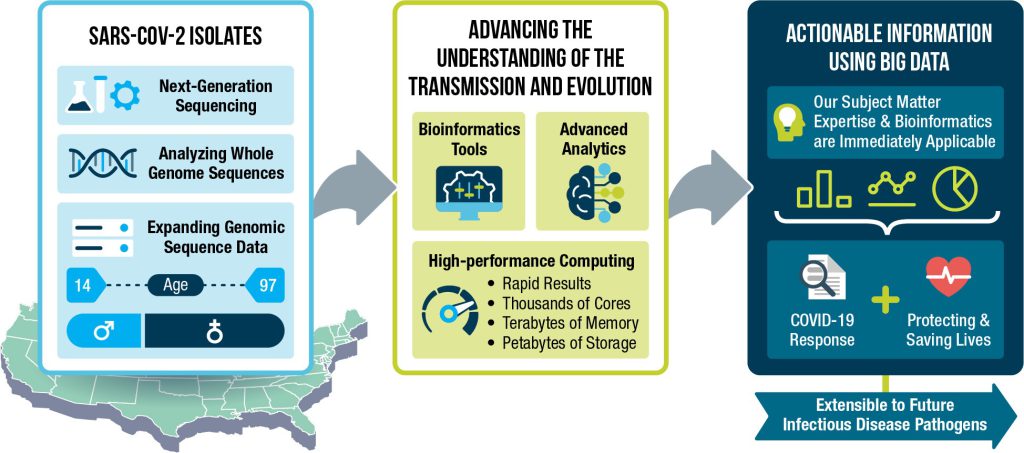
Use Case 2: Army Reserve Members Test Water Source
Members of the 7381 Blood Detachment tested metagenomics analysis of the portable sequencing and analysis system to characterize a local water source. A mix of medical technologists who had no prior experience with genomic sequencing produced sequencing data within 70 minutes of collecting water samples. Following this event, Noblis engineers implemented improvements to the system based on feedback received during this event.
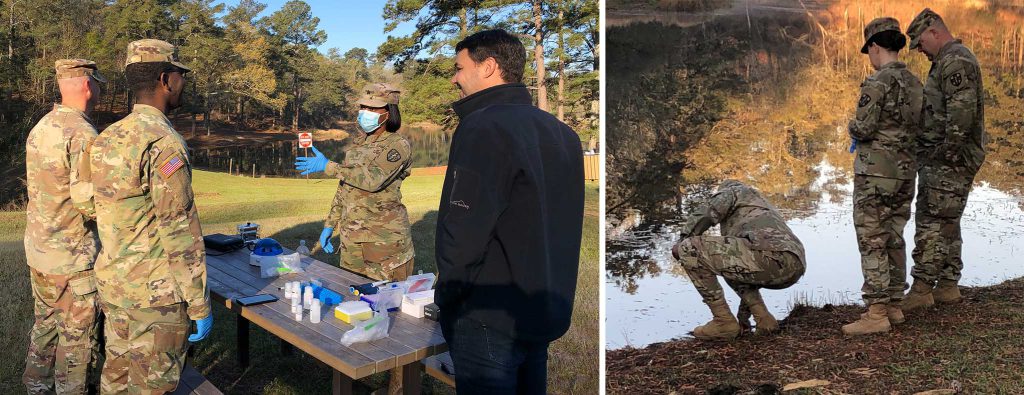
Use Case 3: Virtual Reality (VR) Training for Portable Sequencing and Analysis
CHALLENGE
To enhance efficiency, safety, and learning in training curricula for operations in hazardous environments, such as collecting, preparing and sequencing biological pathogens.
SOLUTION
Using a Unity development environment, Noblis has created a virtual representation of a biological lab facility to serve as a training environment, highlighting the detailed operation of laboratory and detection equipment through visualizations and animations. These immersive virtual environments provide safe and controlled learning areas while allowing trainees to think critically in simulated hazardous scenarios.
OUTCOME
Users can manipulate digital twins of the portable sequencing and analysis equipment as part of training scenarios in which they must demonstrate proper operation of the equipment (figure 3). VR learning provides increased learner engagement and is associated with a higher retention rate of content. By delivering experiential learning through meaningful lessons, students are able to improve performance faster, leading to a greater return on investment. VR-based training programs tend to inspire students and can increase motivation.
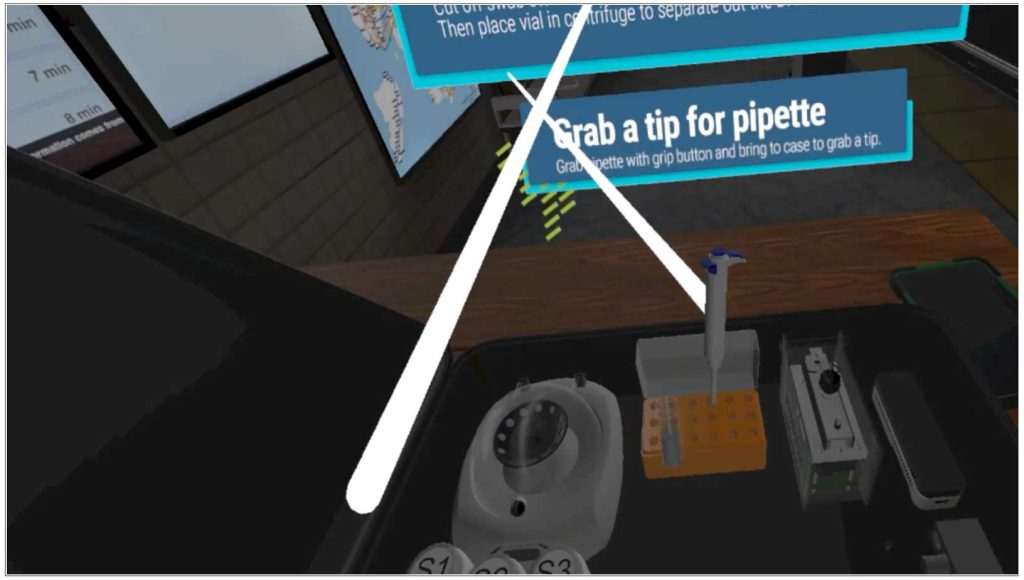
Accomplishments
Since developing this portable system in 2017, Noblis has successfully performed whole genome sequencing runs on more than 70 samples to continuously refine our analytics workflows. Metagenomic analysis has been performed on environmental samples including:
- pond water samples
- soil samples
- dry surface swabs
- dog cheek swabs
- pure cultures
In addition, epigenetic analysis has been performed on pure DNA samples.
Inquiries
Noblis Sponsored Research projects are conceptualized and developed with the public interest and government requirements at the forefront of our envisioned outcomes. We don’t believe in a “one size fits all” approach and can work with your agency to determine how to best tailor our solutions and expertise to your unique needs.
- To learn more about this project and how it could contribute to your mission, contact us here. View our solution spec sheet here.
- To learn more about the Noblis Sponsored Research program, visit noblis.org/r-d.
- To learn more about Noblis capabilities and solutions in life sciences and bioinformatics, visit bioportal.noblis.org.
